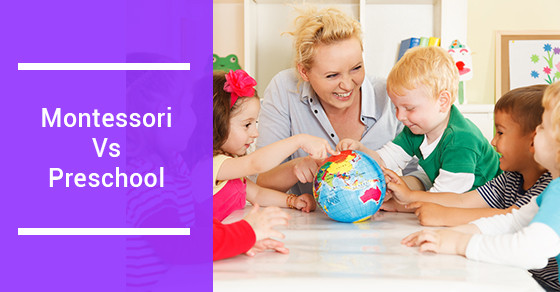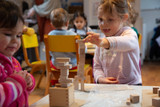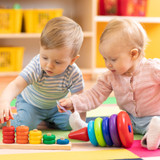Montessori Vs. Preschool: What’s The Difference?
If your child is approaching preschool age, you may be wondering if you should enroll him or her in a Montessori preschool or a traditional preschool. To help you make an informed decision, this blog post will take a look at the differences between the two.
Montessori vs. Preschool: What’s The Difference?
Montessori and traditional preschools are distinct. They both provide a well-rounded education, but their approaches are different. Montessori, for example, has its own philosophy, teaching materials, and associated learning style.
Montessori
The Montessori method was developed by Maria Montessori in Rome in the early 1900s. Montessori was one of the first female doctors in Italy. What distinguishes the Montessori method from traditional preschool is its child-centered approach, wherein learning is individualized, hands on, and done at the child’s pace. Teachers serve as guides, instead of being the center of the classroom.
Montessori in Practice
Children spend a large amount of time playing and interacting with Montessori toys and teaching materials (these can be purchased at Montessori stores). These are designed to be self-corrective. For example, a child will learn that their puzzle isn’t correct because the pieces don’t fit together, not because the teacher told them so. Many parents choose Montessori because it allows their children to develop a sense of independence. This method also develops their confidence and self-discipline.
The classroom experience tends to be quieter and less stressful as well. It may be particularly well-suited to children who are shy, who have various processing disorders, or for children who tend to get distracted at traditional preschool where there’s a lot going on. Another difference is that children between the ages of three and five are together in the same room; this allows older students to serve as role models. Children will typically have the same teacher for those three years as well, which strengthens the student-teacher relationship.
Preschool
Traditional preschool also focuses on play, but this play is less structured. Children play with traditional toys instead of specialized toys and teaching materials. Traditional preschool has more of an emphasis on cultivating imagination. It’s also more teacher-led. Unstructured play is typically followed by a teacher-led lesson. Traditional preschool is also highly regulated in terms of time. Children are constantly changing activities, whereas in the Montessori method children move at their own pace.
The Takeaway
Both Montessori and traditional preschool provide a well-rounded education; their methods and style of learning, however, are different. Your child’s personality may be the best indicator of what program is best suited to them.
Thinkamajigs, a Montessori store, offers high-quality, value-priced Montessori teaching materials, educational toys, games, puzzles, and more, all of which you can view in our catalog here. We ship anywhere in North America. Contact us for more information.
LATEST BLOG POSTS
How To Set Up A Montessori Environment At Home
Creating a Montessori-inspired environment at home provides the opportunity to support your child's...
Montessori & Technology: do they play well together?
Dr. Maria Montessori’s method of teaching children emphasizes the use of concrete materials and hand...
Froebel Gifts: An Introduction
You may have heard of Fröebel Gifts (we carry the full selection here), but you may also wonder what...
Safe Toys for Toddlers: What Parents Should Know
As a parent, you want to be sure that any toys your toddler plays with are safe and age-appropriate....
Infant & Toddler Toy Guide - Part 2
THINKAMAJIGS’ GUIDE TO CHOOSING EDUCATIONAL TOYS FROM BIRTH TO AGE 3PART 2: AGE-RELATED DEVELOPMENTA...
Infant & Toddler Toy Guide - Part 1
THINKAMAJIGS’ GUIDE TO CHOOSING EDUCATIONAL TOYS FROM BIRTH TO AGE 3PART 1: SKILLS DEVELOPMENT“What...







